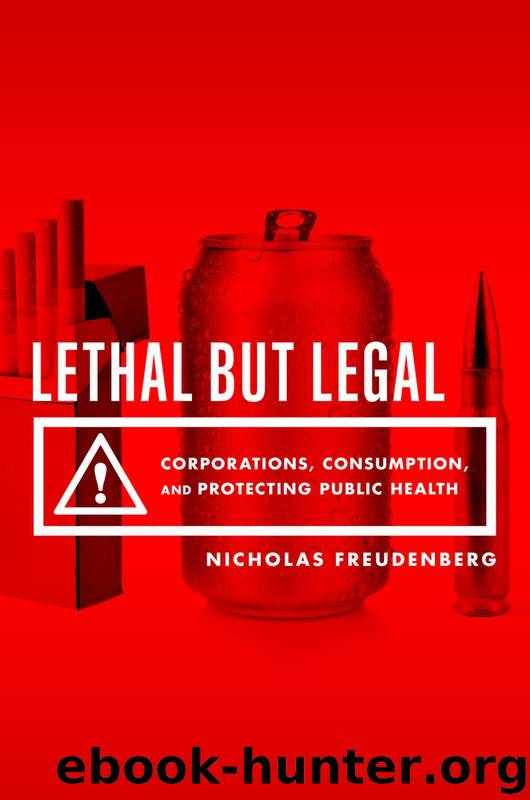Lethal But Legal by Freudenberg Nicholas

Author:Freudenberg, Nicholas
Language: eng
Format: epub
Publisher: Oxford University Press, USA
Published: 2014-03-24T16:00:00+00:00
NATIONAL GOVERNMENTS
Some national governments have also resisted corporate-managed free trade. As I described previously, the Doha Declaration affirmed WTO rules permitting countries to issue compulsory licenses for essential medicines, even if such licenses bypass the patent rights of pharmaceutical companies in developed nations. Let’s examine how Brazil has used this power to develop an internationally recognized model for reducing the burden of HIV infection and AIDS.
Brazil. In 1996, the Brazilian president signed a law establishing free distribution of drugs to people living with HIV/AIDS, the first nation to make such treatment a universal right.109 Pushed by a large and energetic AIDS movement, the Brazilian government made human rights, public health, and economic arguments for maintaining and strengthening the free distribution program. A 2002 report by Brazil’s Ministry of Health concluded that the cost savings of the free distribution program were almost $1.1 billion, all due to its prevention of opportunistic infections and averted hospitalizations.110
Brazil used both threats and action to get the changes it wanted from multinational pharmaceutical companies. In 2001, Brazil announced it was considering breaking patents for two antiretrovirals: nelfinavir, produced by Roche, and efavirenz, produced by Merck, if the companies did not reduce their prices. Merck agreed to lower the price of efavirenz by 60 percent, but when Roche offered a smaller reduction for nelfinavir, the Brazilian government said it intended to break Roche’s patent and to produce nelfinavir domestically at a government laboratory. A few weeks later, Roche agreed to further reduce the price of the drug, and Brazil dropped its plans to break the patent.111
Earlier that year, the United States asked the WTO to examine the compatibility of Brazilian patent laws on compulsory licensing with TRIPS requirements—in essence calling for an investigation of Brazil’s price reduction on life-saving medications. A spate of protest from international AIDS organizations and the UN Human Rights Commission led the United States government to withdraw that request a few months later.
Six years later, after it was revealed that Merck was still charging Brazil $1.59 per pill, while charging Thailand only 65 cents, Brazil did issue a compulsory license for efavirenz.112 The country began manufacturing its own generic version, saving $30 million in 2007 and providing the medication to nearly 65,000 of the 170,000 people in Brazil receiving free HIV treatment.
Predictably, Brazil’s decision elicited a variety of responses. Merck said it was “profoundly disappointed” by the decision and warned that the “expropriation of intellectual property sends a chilling signal to research-based companies.”113 Merck contended that it “cannot sustain a situation in which the developed countries alone are expected to bear the cost for essential drugs.” Pedro Chequer, the former head of Brazil’s AIDS program, said, “I am really proud of this wonderful political decision.” James Love, an economist who runs Knowledge Ecology International, a think tank in Washington, D.C., that supports access to essential medicines, observed that the actions of Brazil, Thailand, and other countries threaten Big Pharma, who worry that this movement could go beyond AIDS to heart disease and other ailments.
Download
This site does not store any files on its server. We only index and link to content provided by other sites. Please contact the content providers to delete copyright contents if any and email us, we'll remove relevant links or contents immediately.
| Administration & Medicine Economics | Allied Health Professions |
| Basic Sciences | Dentistry |
| History | Medical Informatics |
| Medicine | Nursing |
| Pharmacology | Psychology |
| Research | Veterinary Medicine |
Good by S. Walden(3554)
The Social Psychology of Inequality by Unknown(3029)
The Checklist Manifesto by Atul Gawande(2852)
0041152001443424520 .pdf by Unknown(2845)
Get What's Yours for Medicare: Maximize Your Coverage, Minimize Your Costs by Philip Moeller(2727)
The Meaning of the Library by unknow(2571)
Guns, Germs and Steel by Diamond Jared(2369)
Borders by unknow(2313)
23:27 by H. L. Roberts(2249)
And the Band Played On by Randy Shilts(2205)
Being Mortal: Medicine and What Matters in the End by Atul Gawande(2129)
A Leg to Stand On by Oliver Sacks(2036)
The Hot Zone by Richard Preston(2019)
More Than Words (Sweet Lady Kisses) by Helen West(1867)
The Valachi Papers by Peter Maas(1855)
The Laws of Medicine by Siddhartha Mukherjee(1803)
The Andromeda Strain by Michael Crichton(1745)
Get What's Yours for Medicare by Philip Moeller(1738)
The Obesity Epidemic by Robyn Toomath(1676)
